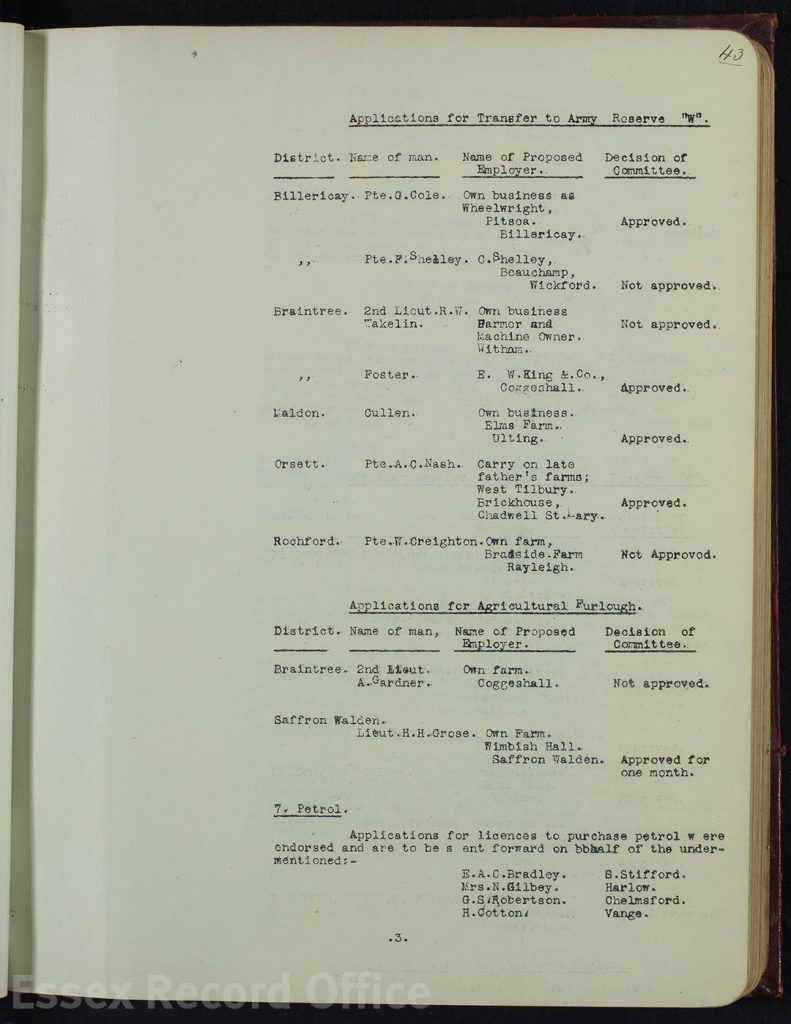This month’s Document of the Month is a small part of the story of how Britain was saved from starvation during the First World War.
100 years ago our ancestors were facing a food crisis. When Britain entered the war on 4 August 1914, the country had enough wheat in stock to last for just 125 days. In the decades preceding the First World War Britain had increasingly relied on imports of food, and by 1914 60% of its food supply was imported. Between 1914 and 1917 these imports were increasingly under attack by German U-boats; by 1914 the Germans were sinking one in four merchant ships in the Atlantic.[1]
Farmers at home faced the huge challenge of growing enough food to feed the nation. Not only did this mean bringing more land under arable cultivation than ever before, it meant doing so with a shortage of male agricultural workers and a shortage of horses.
In an effort to make sure the nation had enough to eat, in late 1915 the Board of Agriculture called for counties to set up War Agricultural Committees. The records of the Essex War Agricultural Committee, today looked after at ERO, can give us valuable insights into the efforts that went in to producing enough food to keep the nation alive.
The War Agricultural Committees were intended to ensure greater productivity of agricultural land and to increase the amount of land under cultivation. Despite their work, by December 1916, the Board of Agriculture was extremely concerned at the decrease in acreages of particular crops, when compared with the previous decades. A meeting that month noted that the combined acreage for the production of wheat, barley, oats, beans, peas and carrots in Essex had fallen from 428,904 in 1874 to 324,352 in 1914. Most of this decrease was due to a drop in wheat production, which was increasingly imported from the USA.
In January 1917, a new committee was formed from members of the existing Essex War Agriculture Committee. The Executive Food Production Committee, later renamed the Agricultural Executive Committee, were required to oversee improvements on an almost full time basis. In their meetings, members discussed the loans of equipment and horses; requests for petrol, the housing of prisoners of war (often in workhouses and camps) and the employment of women on the land. In extreme cases, they could also arrange for the removal of tenants where the land was not being farmed to their approval.
It is clear from an early stage that there were tensions between the agricultural committees and local military tribunals concerning agricultural workers. The minutes often include decisions regarding applications for exemption from call up on the grounds of work of national importance, requesting a transfer to army reserves or release from military service and for temporary leave.
At one such meeting 100 years ago this month, the Agricultural Executive Committee approved a number of applications on these grounds. An H. J. Willett was granted a voucher to remain in employment as a tractor supervisor in Chelmsford and a Private G. Cole was allowed to join the army reserves in order to continue as a wheelwright at Pitsea. This reminds us that farmers and agricultural labourers relied on other skilled workers to maintain and improve production. It would be interesting to see whether the number of applications for exemptions increased as the war progressed and the need for greater production and for more men in the armed forces intensified.

Extract from the Essex Agricultural Executive Committee in September 1917, where applications for transfer to the army reserve or for leave and for petrol licences were discussed (D/Z 47/17)
It is thanks to the efforts of all of those men and women who worked against enormous odds to keep the nation fed during the First World War that Britain never faced famine.
__________________________________________
[1] Figures from World War One: The Few that Fed the Many, published by the National Farmers’ Union, accessed 5 September 2017 https://www.nfuonline.com/assets/33538

We have often wondered how it was that my grandfather’s brother and cousin, both Ag Labs but on different farms, went to the war and he did not. Are there any plans to digitize these records on Seax, for the benefit of the Essex diaspora?